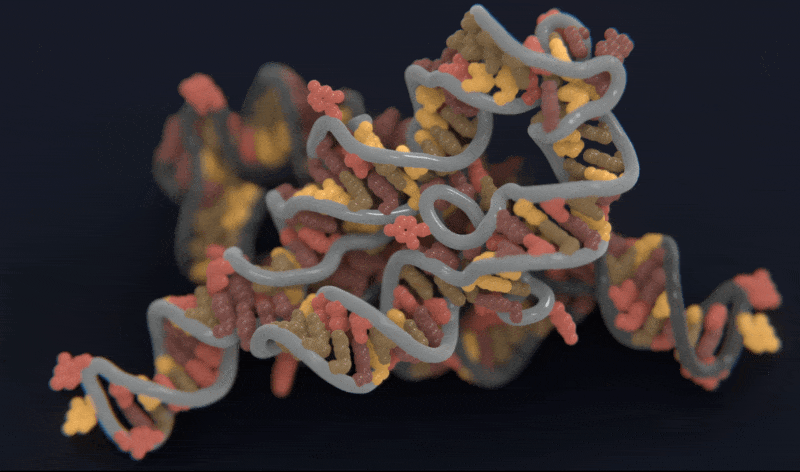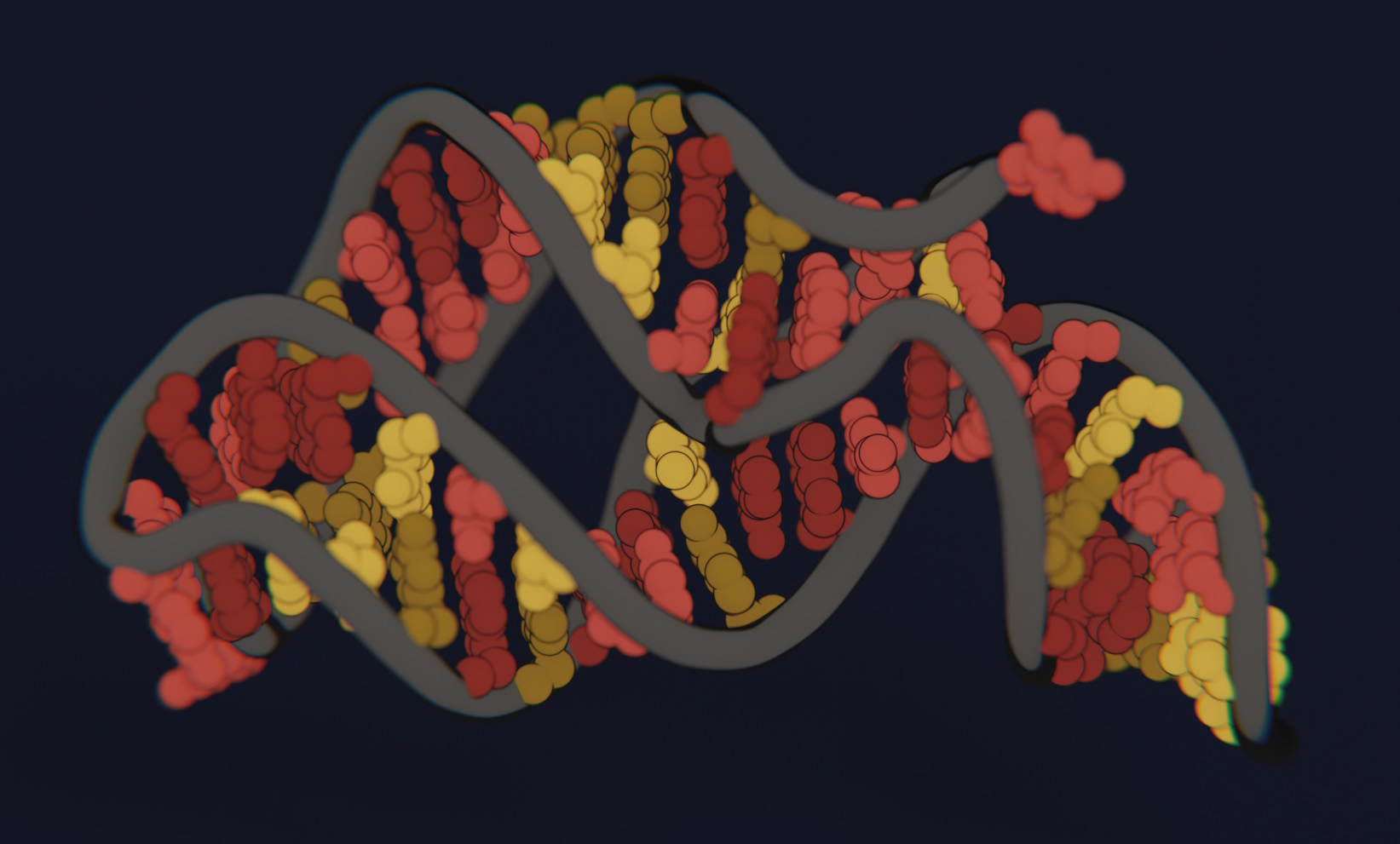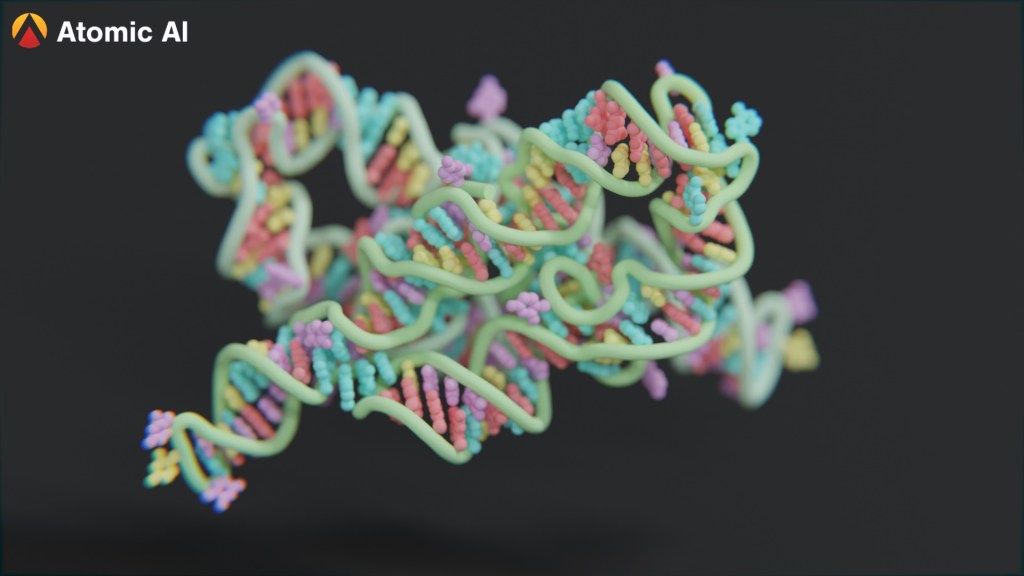The biotech industry is experiencing a rush of AI-powered tools for many aspects of the complex drug discovery process. But one that has flown under the radar, increasingly thought to be key to certain diseases but woefully understudied, is RNA. With $35 million in new funding, Atomic AI aims to do for RNA what AlphaFold did for proteins, and find entirely new treatments in the process.
If you can still recall your high school biology, you probably remember RNA as sort of a middle man between DNA (long term information storage) and proteins (the machinery of cellular life at the molecular level). But like most things in nature, it doesn’t seem to be quite that simple, explained Atomic AI’s CEO and founder, Raphael Townshend.
“There’s this central dogma that DNA goes to RNA, which goes to proteins. But it’s emerged in recent years that it does much more than just encode information,” he said in an interview with TechCrunch. “If you look at the human genome, about 2% becomes protein at some point. But 80 percent becomes RNA. And it’s doing… who knows what? It’s vastly underexplored.”
Compared to DNA and proteins, little work has been done in this area. Academia has focused on other pieces of the puzzle and pharmaceuticals have, partly as a consequence of that, pursued proteins as the mechanisms for drugs. The result is a severe lack of knowledge and data on RNA structures.
But what Atomic AI posits is that RNA is functional and worth pursuing as a method of treatment. The secret is in the “non-coding” regions of RNA, which are like the header and footer on a document. They do protein-like work but aren’t proteins — and they’re not the only example.
You can think about RNA strands as beaded necklaces, much more string than bead. The string is “floppy” and more or less what its detractors think it is: an intermediary. But every once in a while you get a really interesting knot that seems unlikely to have formed by accident. As with proteins, if you can figure out their structure, that goes a long way towards understanding what they do and how they can be affected.
“The key is to find those beads, those structured bits. It’s high information content, it’s targetable, and it’s likely functional as well,” said Townshend. “It’s seen in drug discovery as a key new frontier.”
An interesting idea for a graduate thesis, perhaps (and it was for Townshend), but how can you build a business around it?
First, if the field is about to become more important, building out the methods for studying has a lot of value. Then, if you do build those methods, you can be first in line to use them. Atomic AI is doing both simultaneously.

The core of Atomic’s IP is, though this is something of a simplification, an AlphaFold for RNA. The biology is different, and the way the models work is different, but the idea is the same: a machine learning model trained on a limited set of a type of molecule that can make accurate predictions about the structure of other molecules of that type.
What’s wild is that Townshend’s team made just such a model, which outperforms others by a large margin, by feeding it the characteristics of just 18 RNA molecule structures “published between 1994 and 2006.” This absolutely bare-bones model wiped the floor with others, as disclosed in a front-page article published in Science in 2021.
Since then, Townshend was quick to add, the company has vastly augmented its models and methods with more raw material, much of which it has created itself in its own wet labs. They call the updated set of tools PARSE: Platform for AI-driven RNA Structure Exploration.
“The Science paper represented an initial breakthrough, but we have actually generated a huge amount of… structure-adjacent data,” he explained. “Not the full structure itself, but data related to the structure, tens of millions data points; the same scale of data you’d need to train big language models. And combined with other machine learning work, we have been able to dramatically improve both the speed and accuracy from the paper.”
That means Atomic AI is the only one who, publicly at least, has a system that can take a RNA molecule’s raw data in and spit out a reasonably confident estimate of its structure. That’s useful to anyone doing RNA research in or out of medicine, and with gene therapies and mRNA vaccines, the field is definitely on the rise.

With such a tool you could go one of two ways: license it as a “structure as a service” platform, as Townshend put it, or use it yourself. Atomic has opted for the latter, and is pursuing its own drug discovery program.
This approach has a notable difference from a lot of the AI discovery processes out there. The general idea is you have a protein, say one you want to inhibit expression of in the human body, but what you don’t have is a chemical that binds reliably and exclusively to that protein, exactly where and when you want it to (and cheaply, if possible).
AI drug discovery efforts tend to produce thousands, millions, even billions of candidate molecules that might work, rank them, and let the wet labs start working through the list as fast as they can. If you can find one that meets those above characteristics, you can produce a novel drug or replace a more expensive one on the market. But the key thing is you’re competing to find new binders to a known protein.
“We’re not just finding binders, we’re finding what’s targetable in the first place. The reason that’s interesting is because at the end of the day, these big pharmaceuticals care more about novel biology than novel molecules. You’re enabling something that wasn’t doable before by finding this new target, as opposed to augmenting the number of molecules available to target it,” said Townshend.
Not only that, but some proteins have been found to be nigh undruggable for whatever reason, producing illnesses resistant to medication. RNA could allow treatment of these same illnesses by making an end run around the problem protein.
For the present, Atomic AI has narrowed down the list to certain cancers that result in pathological overproduction of proteins (and hence good options for preempting the mechanism), and neurodegenerative diseases that may also benefit from upstream intervention.
Of course all this work is immensely costly, necessitating as it does a large amount of both lab work and intense data science. Fortunately the company has raised a $35 million A round, led by Playground Global, with participation from 8VC, Factory HQ, Greylock, NotBoring, AME Cloud Ventures, as well as angels Nat Friedman, Doug Mohr, Neal Khosla, and Patrick Hsu. (The company previously raised a $7 million seed round.)
“People have picked all the low-hanging fruit in protein land,” said Townshend. “Now there’s new biology to go after.”































Comment